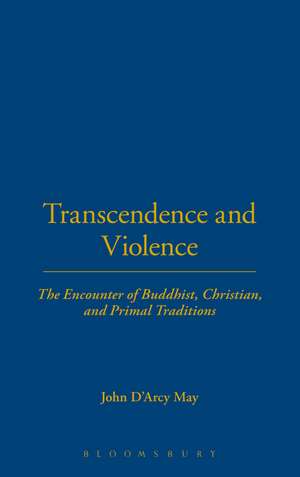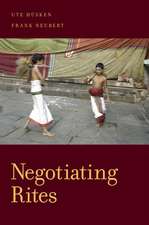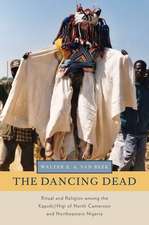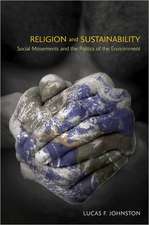Transcendence and Violence: The Encounter of Buddhist, Christian, and Primal Traditions
Autor John D'Arcy Mayen Limba Engleză Hardback – 30 iun 2003
Preț: 497.96 lei
Preț vechi: 688.81 lei
-28% Nou
Puncte Express: 747
Preț estimativ în valută:
95.29€ • 99.74$ • 79.31£
95.29€ • 99.74$ • 79.31£
Carte tipărită la comandă
Livrare economică 31 martie-14 aprilie
Preluare comenzi: 021 569.72.76
Specificații
ISBN-13: 9780826415134
ISBN-10: 082641513X
Pagini: 240
Dimensiuni: 158 x 235 x 24 mm
Greutate: 0.5 kg
Editura: Bloomsbury Publishing
Colecția Continuum
Locul publicării:New York, United States
ISBN-10: 082641513X
Pagini: 240
Dimensiuni: 158 x 235 x 24 mm
Greutate: 0.5 kg
Editura: Bloomsbury Publishing
Colecția Continuum
Locul publicării:New York, United States
Cuprins
Part I: Christianity's Pacific Voyage1. The Christian Encounter with Aboriginal Religion2. Christianity and Modernity in MelanesiaPart II: Buddhism's Asian Journey3. Japanese Buddhism in War and Peace4. The Rebirth of Ethics in Thai BuddhismPart III: Strange Encounters5. Transcending Difference6. Transcending Violence
Recenzii
"Among the many recent studies on religion and violence, John May's is unique. From an historical-comparative analysis of how Christianity, Buddhism, and primal religions have encountered other cultures and religions, May draws bad and good news: Horrible, violent mistakes have been made. But religions can learn from such mistakes. The Transcendence they all seek can, and must, be found not in opposition to but with and through those who are different. This is both a sobering and an encouraging study of the religious potential for violence or peace. Paul F. Knitter, Professor Emeritus, Xavier University
"May faces us with the ugly reality that transcendent faiths like Christianity and Buddhism have perpetuated violence, not only during times of war, but in the very moment when they came into contact with a culture alien to their own. When they met the 'other,' they did not seek to understand it, but to suppress it, destroy it or transform it....But May has not left us with a corpse. He offers us a direction for 'earthing' our respective faiths and thereby reviving them as 'peace' agents in a violent world." -Norman C. Habel, editor of the "Earth Bible" series
"Professor May has made a major contribution toward encouraging the kind of genuine inter-religious dialogue that over time can produce meaningful results for the promotion of real peace instead of the plague of constant violence that continues to infect so many areas of the globe today." -Dharma World, December 2003
"In this very challenging study Australian theologian John D'Arcy May, who is professor of interfaith dialogue at Trinity College in Dublin, examines the historical encounter of Christianity and Buddhism with various cultures and primal religions of the Pacific-Asian region.... The author rightfully concludes his study by stressing the contemporary importance of the primal traditions. More awareness about the unique value of these traditions may help the adherents of universalist religions to control their absolutist temptations, while the adherents of the primal traditions can improve their skill of communication in the new context of globalization." -Missiology
"For May, the privileged encounter between universalist and primal religions is basically ethical or, as he describes it, such encounters should be about acknowledging the other, welcoming the stranger, and reconciling the enemy. In this perspective, difference is not the basis for relationships of superiority and inferiority, but for mutual learning. It is not such a bad idea for the twenty-first century, into which we all entered with great hope, but which has been and continues to be diminished by military conflicts in which religion undoubtedly plays a part."- Susan Smith, Mission Studies, 2005
"May faces us with the ugly reality that transcendent faiths like Christianity and Buddhism have perpetuated violence, not only during times of war, but in the very moment when they came into contact with a culture alien to their own. When they met the 'other,' they did not seek to understand it, but to suppress it, destroy it or transform it....But May has not left us with a corpse. He offers us a direction for 'earthing' our respective faiths and thereby reviving them as 'peace' agents in a violent world." -Norman C. Habel, editor of the "Earth Bible" series
"Professor May has made a major contribution toward encouraging the kind of genuine inter-religious dialogue that over time can produce meaningful results for the promotion of real peace instead of the plague of constant violence that continues to infect so many areas of the globe today." -Dharma World, December 2003
"In this very challenging study Australian theologian John D'Arcy May, who is professor of interfaith dialogue at Trinity College in Dublin, examines the historical encounter of Christianity and Buddhism with various cultures and primal religions of the Pacific-Asian region.... The author rightfully concludes his study by stressing the contemporary importance of the primal traditions. More awareness about the unique value of these traditions may help the adherents of universalist religions to control their absolutist temptations, while the adherents of the primal traditions can improve their skill of communication in the new context of globalization." -Missiology
"For May, the privileged encounter between universalist and primal religions is basically ethical or, as he describes it, such encounters should be about acknowledging the other, welcoming the stranger, and reconciling the enemy. In this perspective, difference is not the basis for relationships of superiority and inferiority, but for mutual learning. It is not such a bad idea for the twenty-first century, into which we all entered with great hope, but which has been and continues to be diminished by military conflicts in which religion undoubtedly plays a part."- Susan Smith, Mission Studies, 2005











